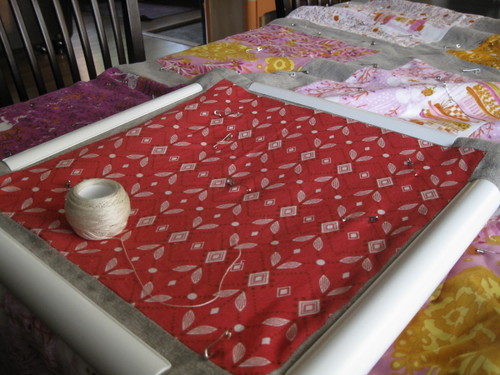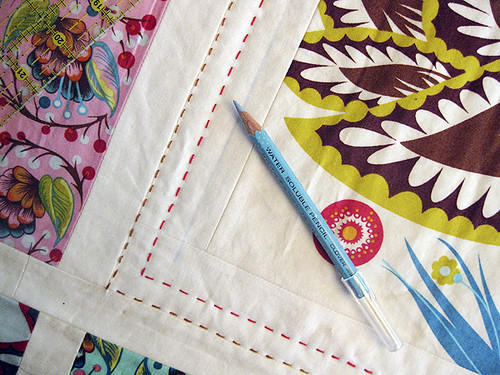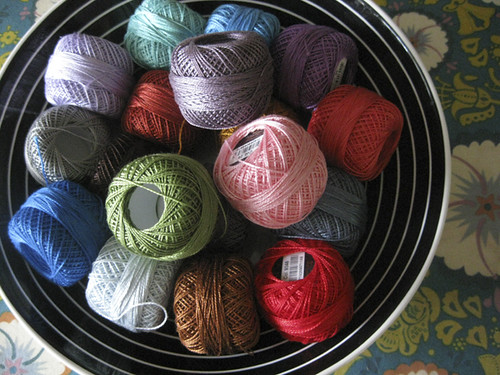tools for Hand Quilting
I learned to hand quilt from Anna Maria Horner's excellent tutorial and Q & A session. Last summer fell in love with the process itself when I hand-quilted Aria's Fairytale Patchwork quilt. I'll be posting a tutorial this week for hand quilting the Loulouthi Tiles quilt. But first, let's talk tools.

:: Quilting Frame ::
Just as with embroidery, you'll want a frame to hold your quilt smooth and taught while hand quilting. You can use a large wooden hoop, but I prefer the Qsnap frames. These lightweight plastic frames are gentler on your quilt than a wooden hoop and allow for easier adjustment. If the quilt is stretched perfectly taught, it's difficult to make even stitches. With Qsnap frames, you can let out some tension until it's just right, again without tugging and squeezing the quilt itself so much. My Qsnap frame is 17" x 17".

:: Tracing Pencils ::
For me, the most challenging part of hand quilting is keeping the stitches s.t.r.a.i.g.h.t (and even). I always trace my stitch lines first for a clear path to follow. Over the years I've tried a number of marking tools like the Hera marker, chalk, disappearing pens, etc. My favorite by far are a set of three water soluble pencils by Clover that I received for Christmas. Here's why: the pencil marks are easier to see than a Hera crease, the pencil marks do not brush off before I want them to like chalk, and the pencil marks do not disappear before I'm done as with pen marks. Clover's pencils glide on easily and make me happy!

:: Pearl Cotton ::
You probably don't need an introduction to pearl cotton thread. Isn't it more lovely than candy in a dish? These beauties are a bit pricey, but I thank each project that requires a new color for my collection! Pearl cotton comes in several different weights, like 5, 7 and 8. The smaller the number, the thicker the thread. I like size 8, which comes in pretty little balls. Unlike embroidery floss, which has 6 strands that are designed to be separated, pearl cotton is designed to be used as one continuous thread. It has the strength to withstand rigorous hand-quilting, but the beauty of embroidery floss.
:: Chenille Needles ::
Because I use chunky pearl cotton, I need a needle with a larger hole for hand quilting. Embroidery needles work well, but my favorite are chenille needles, size 24. They're shorter than embroidery needles which makes it easier for me to achieve the rocking motion necessary for hand quilting. I find that the length of the embroidery needle gets in the way when I'm doing the upwards stitch that moves from the quilt back to top. If you haven't hand quilted before, this probably sounds like nonsense, but come back to this later. You can find chenille needles at most any sewing supplies store. Here's an example.
(Note: I edited this section because I thought I was using a crewel needle, but in fact it was a chenille needle. So sorry!)
::Thimble::
So, actually, I still don't have one. I mean, I have the classic metal thimble, but I can't stand using that. I'd like to try a rubber thimble like this one, but I haven't sprung for it. Working on the Loulouthi quilt has reminded me that I really DO want a thimble. It's funny to say, but I wish I could try on a rubber and a leather one to see which I prefer.
Have I missed anything? If you're a seasoned hand quilter, please let us know what you like to use!

:: Quilting Frame ::
Just as with embroidery, you'll want a frame to hold your quilt smooth and taught while hand quilting. You can use a large wooden hoop, but I prefer the Qsnap frames. These lightweight plastic frames are gentler on your quilt than a wooden hoop and allow for easier adjustment. If the quilt is stretched perfectly taught, it's difficult to make even stitches. With Qsnap frames, you can let out some tension until it's just right, again without tugging and squeezing the quilt itself so much. My Qsnap frame is 17" x 17".

:: Tracing Pencils ::
For me, the most challenging part of hand quilting is keeping the stitches s.t.r.a.i.g.h.t (and even). I always trace my stitch lines first for a clear path to follow. Over the years I've tried a number of marking tools like the Hera marker, chalk, disappearing pens, etc. My favorite by far are a set of three water soluble pencils by Clover that I received for Christmas. Here's why: the pencil marks are easier to see than a Hera crease, the pencil marks do not brush off before I want them to like chalk, and the pencil marks do not disappear before I'm done as with pen marks. Clover's pencils glide on easily and make me happy!

:: Pearl Cotton ::
You probably don't need an introduction to pearl cotton thread. Isn't it more lovely than candy in a dish? These beauties are a bit pricey, but I thank each project that requires a new color for my collection! Pearl cotton comes in several different weights, like 5, 7 and 8. The smaller the number, the thicker the thread. I like size 8, which comes in pretty little balls. Unlike embroidery floss, which has 6 strands that are designed to be separated, pearl cotton is designed to be used as one continuous thread. It has the strength to withstand rigorous hand-quilting, but the beauty of embroidery floss.
:: Chenille Needles ::
Because I use chunky pearl cotton, I need a needle with a larger hole for hand quilting. Embroidery needles work well, but my favorite are chenille needles, size 24. They're shorter than embroidery needles which makes it easier for me to achieve the rocking motion necessary for hand quilting. I find that the length of the embroidery needle gets in the way when I'm doing the upwards stitch that moves from the quilt back to top. If you haven't hand quilted before, this probably sounds like nonsense, but come back to this later. You can find chenille needles at most any sewing supplies store. Here's an example.
(Note: I edited this section because I thought I was using a crewel needle, but in fact it was a chenille needle. So sorry!)
::Thimble::
So, actually, I still don't have one. I mean, I have the classic metal thimble, but I can't stand using that. I'd like to try a rubber thimble like this one, but I haven't sprung for it. Working on the Loulouthi quilt has reminded me that I really DO want a thimble. It's funny to say, but I wish I could try on a rubber and a leather one to see which I prefer.
Have I missed anything? If you're a seasoned hand quilter, please let us know what you like to use!
